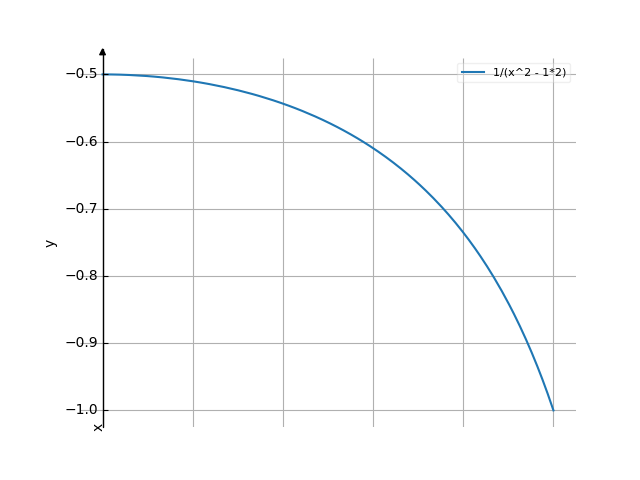Integral of 1/(x^2-2) dx
The solution
You have entered
[src]
1 / | | 1 | 1*------ dx | 2 | x - 2 | / 0
$$\int\limits_{0}^{1} 1 \cdot \frac{1}{x^{2} - 2}\, dx$$
Integral(1/(x^2 - 1*2), (x, 0, 1))
Detail solution
-
Rewrite the integrand:
-
The integral of a constant times a function is the constant times the integral of the function:
-
Integrate term-by-term:
-
The integral of is .
-
The integral of a constant times a function is the constant times the integral of the function:
-
The integral of is .
So, the result is:
-
The result is:
-
So, the result is:
-
-
Add the constant of integration:
The answer is:
The answer (Indefinite)
[src]
/ | ___ / / ___\ / ___\\ | 1 \/ 2 *\- log\x + \/ 2 / + log\x - \/ 2 // | 1*------ dx = C + ----------------------------------------- | 2 4 | x - 2 | /
$${{\log \left({{2\,x-2^{{{3}\over{2}}}}\over{2\,x+2^{{{3}\over{2}}}
}}\right)}\over{2^{{{3}\over{2}}}}}$$
The graph
The answer
[src]
___ / / ___\\ ___ / ___\ ___ / / ___\\ ___ / ___\
\/ 2 *\pi*I + log\\/ 2 // \/ 2 *log\1 + \/ 2 / \/ 2 *\pi*I + log\-1 + \/ 2 // \/ 2 *log\\/ 2 /
- ------------------------- - -------------------- + ------------------------------ + ----------------
4 4 4 4
$${{\log \left(3-2^{{{3}\over{2}}}\right)}\over{2^{{{3}\over{2}}}}}$$
=
=
___ / / ___\\ ___ / ___\ ___ / / ___\\ ___ / ___\
\/ 2 *\pi*I + log\\/ 2 // \/ 2 *log\1 + \/ 2 / \/ 2 *\pi*I + log\-1 + \/ 2 // \/ 2 *log\\/ 2 /
- ------------------------- - -------------------- + ------------------------------ + ----------------
4 4 4 4
$$- \frac{\sqrt{2} \log{\left(1 + \sqrt{2} \right)}}{4} + \frac{\sqrt{2} \log{\left(\sqrt{2} \right)}}{4} - \frac{\sqrt{2} \left(\log{\left(\sqrt{2} \right)} + i \pi\right)}{4} + \frac{\sqrt{2} \left(\log{\left(-1 + \sqrt{2} \right)} + i \pi\right)}{4}$$
The graph

Use the examples entering the upper and lower limits of integration.

![Find the integral of y = f(x) = 1/(x²-2) dx (1 divide by (x squared minus 2)) - with detailed solution [THERE'S THE ANSWER!] 1/(x^2-2)](/media/krcore-image-pods/176/hash/indefinite/d/c0/feb6b10a1fbdf62143e9a4faa4160.png)
 Integral of x/(x^2+1)^6
Integral of x/(x^2+1)^6
 Integral of x5
Integral of x5
 Integral of (1-sin(x))/(x+cos(x))
Integral of (1-sin(x))/(x+cos(x))
 Integral of 1/(x^2-2)
Integral of 1/(x^2-2)